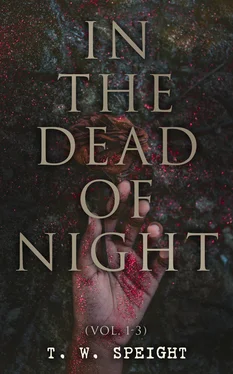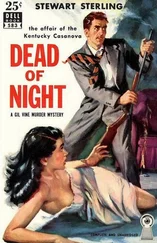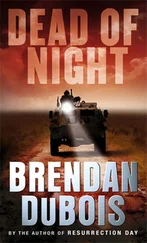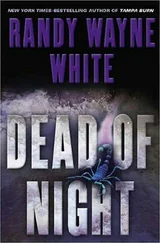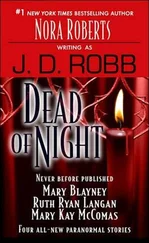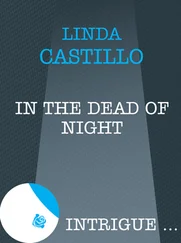T. W. Speight - In the Dead of Night (Vol. 1-3)
Здесь есть возможность читать онлайн «T. W. Speight - In the Dead of Night (Vol. 1-3)» — ознакомительный отрывок электронной книги совершенно бесплатно, а после прочтения отрывка купить полную версию. В некоторых случаях можно слушать аудио, скачать через торрент в формате fb2 и присутствует краткое содержание. Жанр: unrecognised, на английском языке. Описание произведения, (предисловие) а так же отзывы посетителей доступны на портале библиотеки ЛибКат.
- Название:In the Dead of Night (Vol. 1-3)
- Автор:
- Жанр:
- Год:неизвестен
- ISBN:нет данных
- Рейтинг книги:5 / 5. Голосов: 1
-
Избранное:Добавить в избранное
- Отзывы:
-
Ваша оценка:
- 100
- 1
- 2
- 3
- 4
- 5
In the Dead of Night (Vol. 1-3): краткое содержание, описание и аннотация
Предлагаем к чтению аннотацию, описание, краткое содержание или предисловие (зависит от того, что написал сам автор книги «In the Dead of Night (Vol. 1-3)»). Если вы не нашли необходимую информацию о книге — напишите в комментариях, мы постараемся отыскать её.
In the Dead of Night (Vol. 1-3) — читать онлайн ознакомительный отрывок
Ниже представлен текст книги, разбитый по страницам. Система сохранения места последней прочитанной страницы, позволяет с удобством читать онлайн бесплатно книгу «In the Dead of Night (Vol. 1-3)», без необходимости каждый раз заново искать на чём Вы остановились. Поставьте закладку, и сможете в любой момент перейти на страницу, на которой закончили чтение.
Интервал:
Закладка:
He was a very proud man, this heavy, awkward-looking, middle-aged banker. His secret ambition was to obtain a footing among the county families of Duxley and its neighbourhood, and to be treated by them, if not exactly as an equal, yet with as near an approach to that blissful state of things as might be. But, somehow, notwithstanding all his efforts, the old plebeian taint seemed still to cling to him. The people among whom it was his highest ambition to live and move simply tolerated him, and that was all. He was rich, and, to a certain extent, was still a rising man. He could be made use of in many ways. So he was invited to their state-dinners, and sometimes to their more private balls and parties; but, for all that, he felt that he did not belong to them--that he never could belong to them--that he stood outside a magic circle which to him must be for ever impassable. It was only by slow degrees, and after a long time, that these disagreeable truths were brought fully home to the banker's mind. But when he did realize them, he bethought himself that he had a son.
Mr. Cope's stanchest friend and best ally was, undoubtedly, Squire Culpepper, of Pincote. It had been the banker's good fortune, some thirty odd years ago, to be in a position to do an essential service to Titus Culpepper, at that time an impecunious young man, without a profession, and with no prospects in particular; and the squire, when he afterwards came into his property, was not the man to forget it. At Pincote the banker was ever a welcome guest; and if any one had asked the squire to point out the man whom he believed to be his best friend, that man would undoubtedly have been Horatio Cope.
It was a great step in Mr. Cope's favour to be so taken in hand by a man like Mr. Culpepper, who, although only moderately rich, and a commoner, was the representative of one of the most ancient and respected families in the county, and could, in fact, show a pedigree older by two centuries and a half than that of the great Duke of Midlandshire himself. Squire Culpepper had only one child, a daughter; and it seemed to Mr. Cope that it would be an excellent thing if a match could be brought about between his son and the young lady in question. By marrying Miss Culpepper, his son would at once secure a position in society such as he himself could never hope to attain; and if, in addition, the young man could be smuggled into parliament, and could succeed in making one tolerably good speech there, why, then he thought that the great ambition of his life would be as near fulfilment as it was ever likely to be in his time. By what occult means Mr. Cope succeeded in inducing the squire to so far overcome the prejudices of caste as to agree to the marriage of his daughter with the grandson of a man who had lighted the fires and swept out the offices of Sugden's bank, was best known to himself. But certain it is that he did succeed; and the match was arranged, and the pecuniary conditions agreed upon, before either of the two persons most interested so much as knew a word about it.
Squire Culpepper, at this time, was from fifty-five to sixty years old. He was a short, wiry, keen-faced man, with restless, fidgety ways, and a firm belief in his own shrewdness and knowledge of the world. Except when dressed for dinner, his ordinary attire was a homely suit of shepherd's plaid, with thick shoes and gaiters. His head-gear was a white hat, with a black band, generally much the worse for wear. The squire's shabby hats were known to everybody. His tongue was sharp, and his temper hasty, but he was as sweet and sound at heart as one of his own Ribstone pippins.
Mr. Cope had a fine, handsome modern-built house just outside Duxley. When Lionel arrived, he found his host in the drawing-room waiting to receive him. The squire had not yet come. When he did arrive, he was half-an-hour past his time. He apologized, on the ground that he had been to a sale of cattle some twenty miles off, and had not been able to get back earlier. It was obvious to Lionel, and doubtless to Mr. Cope also, that the squire had been drinking--not inordinately, by any means, but just enough to make him more merry and talkative than usual. After dinner, some splendid old port was put on the table; and it seemed to Lionel that the banker, while drinking nothing but an innocuous claret himself, kept pressing the decanter of port on the squire's attention oftener than was at all necessary, and seemingly of set purpose. The squire, nothing loath, smacked his lips, and drank glass after glass with evident gusto. As a consequence, he became more merry and communicative than ever. Had Lionel known at the time what a very rare occurrence it was for the squire to allow himself to become, even in the slightest degree, the worse for wine, he might have asked himself whether the banker's object was not to obtain from him, while in that talkative mood, certain information which it would have been hopeless to expect him to divulge at any other time. But Lionel, knowing nothing of this, was entirely in the dark as to what Mr. Cope's object could possibly be.
"Did you buy any stock at Cottingly, to-day?" asked the banker.
"Not a single hoof," answered the squire. "The prices were ruination. I'll keep my money in my pocket, and wait for better times."
"You know Cottingly, don't you?" he asked presently of the banker.
"Pretty well," answered Mr. Cope.
"Do you know Drake and Harding, the architects?"
"I've heard of the firm--nothing more. But if you want an architect, there's a clever young fellow here in Duxley."
"I know him. His name's Beakon. He's quite a fool."
"Quite a fool, is he?" said the banker, equably. "So be it."
"I've proved it, sir--proved it. No, Drake and Harding are the men for my money. Everything's settled. They'll bring the plans over to Pincote on Wednesday afternoon. If you have nothing better to do, you may as well drive over and help me to decide on the most suitable one."
"The plans! What plans?" said Mr. Cope, in astonishment. "You forget that I'm altogether in the dark."
"Why, what plans could I mean but the plans for my new house?" cried the squire, as he refilled his glass. "I thought I had told you all about it weeks ago."
"This is the first time you have ever hinted at such a thing. But you don't mean to say that you are going to pull down Pincote!"
"I mean to say nothing of the kind," said the squire, peevishly. "But, for all that, I may be allowed to build myself a new house if I choose to do so, I suppose?"
"Certainly--certainly," said the banker, with a look of deprecation.
"I know what you think."
"I beg your pardon."
"I say, sir, that I know what you think," repeated the squire, with half-sober vehemence. "You think that because I've reduced my balance during the last six months from nine thousand pounds to somewhere about three thousand, and because I've sold all my stocks and securities, that I've been making ducks and drakes of my money, and don't know what I'm about. But you never made a greater mistake in your life, Horatio Cope."
"You do me a great injustice, my dear squire. No such thought ever entered my mind."
"Don't tell me. I know what you bankers are."
Mr. Cope shrugged his shoulders and looked, at Lionel with the air of an injured man.
"You don't believe in any speculation unless you've a finger in the pie yourself," continued the squire. "But other people have got their heads screwed on right as well as you. Why, man, I tell you that in less than six months from this time, I shall be worth an extra hundred thousand pounds at the very least."
"I'm truly delighted to hear it," said the banker, heartily. "No man will congratulate you with more sincerity than I shall."
"And you ought to be delighted to hear it, seeing that my daughter and your son will soon be man and wife. But, mind you, I don't mean to turn miser with it. I intend to build, and plant, and dig. You know Knockley Holt, that bit of scrubby ground just outside the park?"
Читать дальшеИнтервал:
Закладка:
Похожие книги на «In the Dead of Night (Vol. 1-3)»
Представляем Вашему вниманию похожие книги на «In the Dead of Night (Vol. 1-3)» списком для выбора. Мы отобрали схожую по названию и смыслу литературу в надежде предоставить читателям больше вариантов отыскать новые, интересные, ещё непрочитанные произведения.
Обсуждение, отзывы о книге «In the Dead of Night (Vol. 1-3)» и просто собственные мнения читателей. Оставьте ваши комментарии, напишите, что Вы думаете о произведении, его смысле или главных героях. Укажите что конкретно понравилось, а что нет, и почему Вы так считаете.
